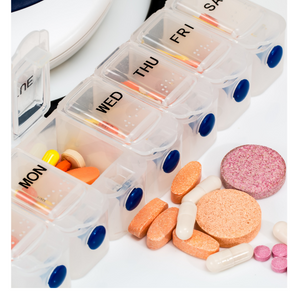By: Carol Langer, Treasurer of The MSA Coalition
I am currently the treasurer of The MSA Coalition, but I was also the care partner for my husband Rob for over 11 years after his MSA diagnosis. Because I have a background in finance, I like to take time in January to make sure things are organized for the coming year. There are so many things to keep track of as a care partner!
Forms and Permissions
 Did you know that you need special permission to access your loved one’s medical records? And a second one for Medicare? And yet another for Social Security? A power of attorney or health care proxy alone will not be adequate.
Did you know that you need special permission to access your loved one’s medical records? And a second one for Medicare? And yet another for Social Security? A power of attorney or health care proxy alone will not be adequate.
- HIPPA Release Forms: These vary by state or provider, but they are critical if you need to be able to advocate for your patient. Here’s an example of a standard one.
- Medicare Authorization Form: This is the standard form and needs to be submitted by mail.
- Social Security Representative Payee Program: This program allows a loved one or friend to take over administration of a patient’s Social Security or Social Security Disability income if they are unable to manage their own funds. This may not be an issue for patients at first but may become an issue as the illness progresses.
Other Legal Documents
- Will: If you don’t have this in place already for your loved one, now is the time to contact an attorney and get it done. Wills are specific to the state in which you live, so if you have moved your loved one with MSA to another state to be closer to family, you need to amend the will. You should also have wills reviewed if they were done more than 5-10 years ago, as the laws change.
- Health Care Proxy: There are standard forms available to establish a Health Care Proxy, but you may want to customize yours to include an advanced directive that specifies what kind of care you want in specific situations. Many couples choose their spouse to be their proxy, but the well spouse may want to consider choosing another family member or friend instead of, or in addition to, their spouse with MSA, as the ill spouse may be unable to make decisions in the event of an emergency.
- MOLST or POLST Form (“Medical” or “Portable” Order for Life Sustaining Treatment): This form is specific to the state you live in and is completed in consultation with a medical professional. While these are similar to an Advance Directive, MOLST or POLST forms are generally more detailed. Here is an example from Massachusetts, where I live, but you can find the form specific to your state by doing a quick search online.
- Do Not Resuscitate (DNR) Order Form – This has largely been replaced by the MOLST or POLST form, but you can see an example here.
Organizing All the Appointments
 One symptom of MSA is an impaired executive function, which affects the ability to plan and organize, among other things. Because the patient may not be able to keep track of all the things s/he needs to, the care partner will need to step in to help or take charge.
One symptom of MSA is an impaired executive function, which affects the ability to plan and organize, among other things. Because the patient may not be able to keep track of all the things s/he needs to, the care partner will need to step in to help or take charge.
When Rob was ill, there was one year where I counted all the appointments he had with medical professionals – there were 136! That’s more than two a week, so you need to be disciplined about keeping track of these. Whether you use a paper calendar or an electronic one (my personal favorite), carry it with you to appointments and write down every new one at the time it is made. Those little cards and slips of paper disappear very quickly! Color coding the appointments is a good way to keep the patient’s appointment separate from the care partner’s.
Medication Management
 Many MSA patients take multiple medications. In the year that I counted, Rob took 12,410 – that’s 34 a day! Several of them, like those for blood pressure or movement, may be time sensitive.
Many MSA patients take multiple medications. In the year that I counted, Rob took 12,410 – that’s 34 a day! Several of them, like those for blood pressure or movement, may be time sensitive.
There are services that will package medications into convenient dose packs for you like Amazon, CVS, and others. If you prefer to do it yourself, you can also use an inexpensive pill organizer found in most grocery or drug stores. Setting it up by dose makes it much easier and can help ensure no doses are missed.
Medication reminders are very helpful. You can set alarms on your and/or the patient’s phone. I recently saw a great tip from a care partner in one of the Facebook groups to set up a reminder using an Amazon Alexa or similar virtual home assistant device – Alexa never forgets! Of course, this only works if you are at home.
Caring for the Care Partner
 Caring for the care partner is important too! Make sure to schedule some “me” time in your day, even if it’s only 20 minutes to sit undisturbed with a cup of tea and a book. Care partner burnout is real, and you can’t provide effective care to your loved one if you, yourself, are exhausted and burned out.
Caring for the care partner is important too! Make sure to schedule some “me” time in your day, even if it’s only 20 minutes to sit undisturbed with a cup of tea and a book. Care partner burnout is real, and you can’t provide effective care to your loved one if you, yourself, are exhausted and burned out.
